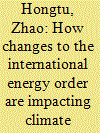| Srl | Item |
| 1 |
ID:
162318


|
|
|
|
|
| Summary/Abstract |
Carbon emissions are posing continuing threats to climate change and becoming the important evaluation indicator for sustainable development. The amount of global carbon emission is increasing largely, with coal-fired power plants (CPP) being the major contributor. This study proposes dynamic equilibrium strategy based on biomass-coal co-firing method to reduce carbon emissions, in which bi-level programming method is employed to build a cooperative relationship between the authority and CPPs, dynamic programming method is used to handle biomass availability time conflict, multi-objective programming method is applied to seek the trade-off between economic development and environmental protection, and furthermore uncertainty theory is introduced to address imprecise uncertain parameters. The proposed model is then applied to a case in Jiangsu, China, to demonstrate its efficiency and practicality, and an interactive algorithm is developed as the solution approach to represent the objectives and limitations between several stakeholders. Based on analyses and discussions under different scenarios, the proposed method can achieve economic-environmental coordination and realize sustainable development, and moreover a carbon emissions allocation competition mechanism is recommended. This methodology could be used in various countries and industries with only slight adjustments needed to some parameters.
|
|
|
|
|
|
|
|
|
|
|
|
|
|
|
|
| 2 |
ID:
126408


|
|
|
| 3 |
ID:
138919


|
|
|
|
|
| Summary/Abstract |
In 2008, the European Union (EU) decided to include aviation in its Emissions Trading System (ETS) in order to realize emissions reductions in the aviation sector. However, the unilateral measure has triggered strong opposition from various actors, and now, the EU finds itself in the middle of a substantial power struggle about the creation of a global scheme for international aviation emissions reduction. China plays an important role as it has not only banned its airlines from complying with the EU ETS, but also implemented economic retaliatory measures, such as freezing orders of new European Airbus aircraft. Consequently, Beijing could successfully form coalitions with other countries to dilute international negotiations at the International Civil Aviation Organization (ICAO) assembly in 2013. The study reveals the hardships that the establishment of a global carbon emissions reduction scheme for aviation faces. It discusses the leading role of the EU on the issue, and provides a general assessment of possible responses to the aviation directive. It then analyzes China’s position on the inclusion of aviation under a global carbon reduction scheme. Finally, the study provides a prospect on how to overcome the diplomatic struggle in order to achieve concrete carbon emission reductions in aviation. As the study concludes, the EU and the rest of the world would be better off by refraining from unilateral mitigation measures and emphasizing more involvement, engagement, and capacity building in negotiating a possible carbon reduction scheme at the international level.
|
|
|
|
|
|
|
|
|
|
|
|
|
|
|
|